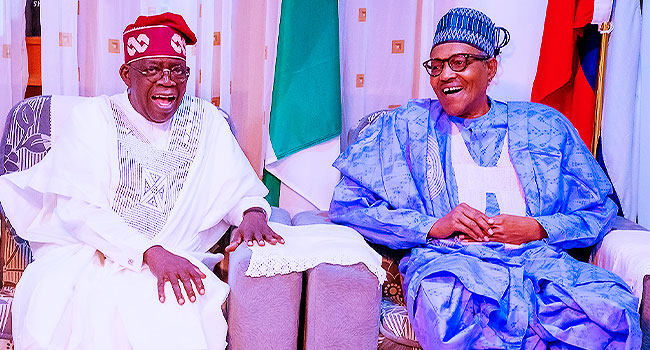Tinubu reverses Buhari’s policies on cryptocurrency and old Naira notes
In the last six months, President Bola Tinubu has reversed many of the policies that his predecessor, Muhammadu Buhari, had introduced.
Despite belonging to the same political party, the two leaders have very different views on economic matters.
Mr Tinubu, who used to be the Governor of Lagos State, favours a more liberal approach to the economy, while Buhari, a former military ruler, prefers a more restrictive one. They joined forces in 2013 to challenge former President Goodluck Jonathan.
ALSO READ: Senate approves 2024 budget, increases by N1.2 trillion
Mr Tinubu did not criticize the government’s policies for eight years, until he felt that one of them was aimed at him during the election.
He openly opposed the former administration’s plan to redesign the Naira during the election.
Since he became the President, Mr Tinubu has been dismantling some of the policies that former President Buhari had implemented.
Six major policies that President Tinubu has changed
Removing ASUU from IPPIS
The IPPIS platform was a source of conflict between university lecturers and President Tinubu for a long time.
The lecturers claimed that the platform did not suit their needs and that it deprived them of some benefits and allowances.
The deadlock resulted in schools being closed for months every year. Under Buhari, Nigerian universities were closed for 1,086 days.
ASUU suggested UTAS as an alternative, but the Buhari administration rejected it, leading to a long strike that kept students out of school.
Ban on Cryptocurrency
Another significant policy that this government has overturned is the ban on cryptocurrency that was imposed by former CBN governor, Godwin Emefiele.
On February 5, the CBN under Emefiele ordered all banks to shut down all accounts that were involved in cryptocurrency transactions.
Recently, Yemi Cardoso, the new CBN governor, reversed that policy and lifted the ban on cryptocurrency.
43 Items on FX ban
On October 12, the CBN lifted the 8-year ban on 43 items that were barred from accessing foreign exchange from the official market.
DWORLDGIST remembers that in 2015, the CBN banned 43 items, such as rice, cement and poultry, from getting forex.
By lifting the ban, the monetary authorities say that importers of the items can buy foreign exchange in the Nigerian Foreign Exchange Market.
It is worth remembering that protectionism policies were the cornerstone of the Buhari administration.
The former President closed land borders for years to protect the agricultural sector, especially rice.
Mr Emefiele had invested money in the rice production sector through the anchor borrowers programme.
Phase out of old Naira
The redesigning of the Naira was a hot topic during the election, as many people thought it was aimed at President Tinubu.
The policy caused a shortage of the Naira, which made it difficult for people to get cash for even basic transactions.
Some state governments challenged the policy at the Supreme Court. However, the court did not give a ruling until after the election. The court decided that the two currencies should co-exist until December 2023.
However, in November, the government announced that the old currency would remain valid indefinitely.
40 per cent IGR of schools
Through the Finance Act of 2020, the Buhari administration required a 40 per cent automatic deduction of gross IGR of partially funded agencies, including federal government-owned institutions.
The current administration tried to enforce the law in October but later gave in to the pressure from the universities.
